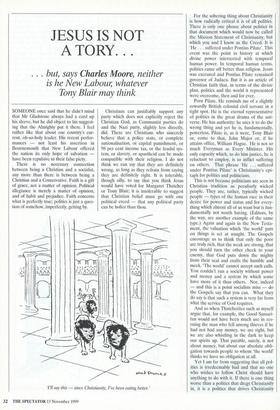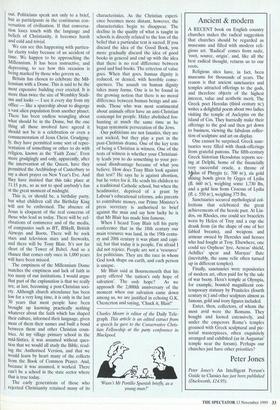JESUS IS NOT A TORY.. .
but, says Charles Moore, neither is he New Labour, whatever Tony Blair may think
SOMEONE once said that he didn't mind that Mr Gladstone always had a card up his sleeve, but he did object to his suggest- ing that the Almighty put it there. I feel rather like that about our country's cur- rent, oh-so-holy leader. His recent perfor- mances — not least his assertion in Bournemouth that New Labour offered the nation its only hope of salvation have been repulsive in their false piety.
There is no necessary connection between being a Christian and a socialist, any more than there is between being a Christian and a Conservative. Faith is a gift of grace, not a matter of opinion. Political allegiance is merely a matter of opinion, and of habit and prejudice. Faith concerns what is perfectly true; politics is just a ques- tion of somehow, imperfectly, getting by. Christians can justifiably support any party which does not explicitly reject the Christian God, as Communist parties do and the Nazi party, slightly less directly, did. There are Christians who sincerely believe that a police state, or complete nationalisation, or capital punishment, or 98 per cent income tax, or the feudal sys- tem, or slavery, or apartheid can be made compatible with their religion. I do not think we can say that they are definitely wrong, as long as they refrain from saying they are definitely right. It is tolerable, though silly, to say that you think Jesus would have voted for Margaret Thatcher or Tony Blair; it is intolerable to suggest that Christian belief must go with one political creed — that any political party can be holier than thou.
'I'll say this — since Christianity, I've been eating better.' For the sobering thing about Christianity is how radically critical it is of all politics. There is only one phrase about politics in that document which would now be called the Mission Statement of Christianity, but which you and I know as the Creed. It is 'He ... suffered under Pontius Pilate'. This event was the point in history at which divine power intersected with temporal human power. In temporal human terms, politics came off better than religion. Jesus was executed and Pontius Pilate remained governor of Judaea. But it is an article of Christian faith that, in terms of the divine plan, politics and the world it represented were overcome, then and for ever.
Poor Pilate. He reminds me of a slightly cowardly British colonial civil servant in a tight spot. He is the eternal representative of politics in the great drama of the uni- verse. He has authority: he uses it to do the wrong thing and yet he is, fundamentally, powerless. Pilate is, as it were, Tony Blair or, come to that, John Major or, if he attains office, William Hague. He is not so much Everyman as Every Minister. His only capacity which, to do him justice, he is reluctant to employ, is to inflict suffering on others. That phrase 'He ... suffered under Pontius Pilate' is Christianity's epi- taph for politics and politicians.
This is not because politicians are seen in Christian tradition as peculiarly wicked people. They are, rather, typically wicked people — types of the human race in their desire for power and status and for every- thing which almost all of us want but is fun- damentally not worth having. (Editors, by the way, are another example of the same type.) Again and again in the New Testa- ment, the valuation which 'the world' puts on things is set at naught. The Gospels encourage us to think that only the poor are truly rich, that the weak are strong, that you should turn the other cheek to your enemy, that God puts down the mighty from their seat and exalts the humble and meek. The world' cannot accept such calls.
You couldn't run a society without power and money and a system by which some have more of it than others. Nor, indeed — and this is a point socialists miss — do the Gospels say that you can. What they do say is that such a system is very far from what the service of God requires.
And so when Thatcherites such as myself argue that, for example, the Good Samari- tan would not have been much use in res- cuing the man who fell among thieves if he had not had any money, we are right, but we are also whistling in the dark to keep our spirits up. That parable, surely, is not about money, but about our absolute obli- gation towards people to whom 'the world' thinks we have no obligation at all.
Yet I am far from suggesting that all pol- itics is irredeemably bad and that no one who wishes to follow Christ should have anything to do with it. If there is one thing worse than a politics that drags Christianity in, it is a politics that drives Christianity out. Politicians speak not only to a brief, but as participants in the continuous con- versation of civilisation. If that conversa- tion loses touch with the language and beliefs of Christianity, it becomes harsh and cold and trivial.
We can see this happening with particu- lar clarity today because of an accident of time. We happen to be approaching the Millennium. It has been instructive, and depressing, to see how this occasion is being marked by those who govern us.
Britain has chosen to celebrate the Mil- lennium with a Dome. This is said to be the most expensive building ever erected. It is more than twice the size of Wembley Stadi- um and looks — I see it every day from my office — like a spaceship about to disgorge a vast alien population from another planet. There has been endless wrangling about what should be in the Dome, but the one thing all those involved have agreed it should not be is a celebration or even a commemoration of Jesus Christ. Grudging- ly, they have permitted some sort of repre- sentation of something or other to do with religion, known as the 'Faith Zone'. Even more grudgingly and only, apparently, after the intervention of the Queen, have they permitted the Archbishop of Canterbury to say a short prayer on New Year's Eve. And they have insisted that this take place at 11.15 p.m., so as not to spoil anybody's fun at the great moment of midnight.
This is, or should be, a birthday party, but what children call the Birthday King will not be enthroned. The absence of Jesus is eloquent 'of the real concerns of those who lead us today. There will be cel- ebrations of commerce and of the media, of companies such as BT, BSkyB, British Airways and Boots. There will be rock stars and television stars and fireworks, and there will be Tony Blair. It's not far short of the Tower of Babel. And so a chance that comes only once in 1,000 years will have been missed.
The emptiness of the Millennium Dome matches the emptiness and lack of faith in too many of our institutions. I would argue that part of the explanation is that we really are, at last, becoming a post-Christian soci- ety. Although church attendance has been low for a very long time, it is only in the last 30 years that most people have been brought up knowing practically nothing whatever about the faith which has shaped their culture, informed their language, given most of them their names and built a bond between them and other Christian coun- tries. At my village primary school in the mid-Sixties, it was assumed without ques- tion that we would all study the Bible, read- ing the Authorised Version, and that we would learn by heart many of the collects from the Book of Common Prayer. And, because it was assumed, it worked. There can't be a school in the state sector where that is true today.
The early generations of those who rejected Christianity retained many of its characteristics. As the Christian experi- ence becomes more distant, however, the characteristics begin to disappear. The decline in the quality of what is taught in schools is directly related to the loss of the belief that a particular text is sacred. If you discard the idea of the Good Book, you more gradually discard the idea of good books in general and end up with the idea that there is no real difference between good and bad books. The criterion of value goes. When that goes, human dignity is reduced, or denied, with horrible conse- quences. The assault on human dignity takes many forms. One is to be found in the growing notion that there is no moral difference between human beings and ani- mals. Those who wax most sentimental about animals often have an anti-Christian contempt for people. Hitler abolished fox- hunting at much the same time as he began systematic persecution of the Jews.
Our politicians are not fanatics, they are not wicked, but they play a part in the post-Christian drama. One of the key tests of being a Christian is witness. One of the tests of witness is whether your Christiani- ty leads you to do something to your per- sonal disadvantage because of what you believe. How does Tony Blair look against that test? He says he is against abortion, but he votes for it. He sends his children to a traditional Catholic school, but when the headmaster, deprived of a grant by Labour's educational reforms, asks parents to contribute money, our Prime Minister's press secretary is authorised to brief against the man and say how lucky he is that Mr Blair has made him famous.
When I heard Tony Blair tell his party conference that in the 18th century our main resource was land, in the 19th centu- ry and 20th century it was plant and capi- tal, but that today it is people, I'm afraid I did not rejoice. People are not a 'resource' for politicians. They are the race in whom God took shape on earth, and each person is unique.
Mr Blair said at Bournemouth that his party offered 'the nation's only hope of
salvation'. The only hope? As we approach the 2,000th anniversary of the moment when our salvation came down among us, we are justified in echoing G.K. Chesterton and saying, 'Chuck it, Blair!'
Charles Moore is editor of the Daily Tele- graph. This article is an edited extract from a speech he gave to the Conservative Chris- tian Fellowship at the party conference in Blackpool.
'Wasn't Mr Portillo Spanish briefly, as a young man?'



























































































 Previous page
Previous page